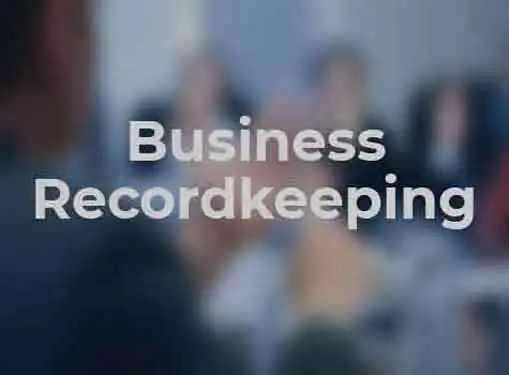Small Business Accounting
Business Recordkeeping
Business recordkeeping isn't an art form. There are certain records you should keep and certain records you should toss. This article discusses what business records must be kept and which can go into the shredder.
Everyone knows that recordkeeping is just part of doing business. But which records should you keep and which ones should you toss?

Throw away too much and you'll find yourself in hot water with your accountant. On the other hand, if you keep everything you'll bury yourself beneath a paper avalanche.
There's got to be a happy balance between the two, right?
Fortunately there is a happy balance, and knowing where that balance lies is critically important to your company's success. Although there is no legal mandate to maintain a particular recordkeeping system, an efficient and organized system is necessary for a variety of reasons, not the least of which is to provide supporting documentation for income, expenses, and other items your business is required to report to the I.R.S.
The guidelines published by the I.R.S. contain several categories of records you should keep, including the following:
Gross Receipts
Gross receipts represent the income you bring in through your business. Records of gross receipts are used to determine your gross income not only for tax purposes, but for your company's financial statements as well. Records related to receipts should include information detailing the sale amount, sale date, and buyer.
Purchases
Unless you are in an exclusively-service related industry, you'll need to keep track of the amount you spend on items for resale including raw materials, parts, and finished products. The amount of these purchases is deductible from your gross income, but only to the extent you are able to prove who you bought the products from and the amount you paid.
Expenses
In most cases, expenses represent the biggest category of receipts in a small business. Records detailing expenses dates, amounts, and payees need to be maintained for everything from utilities to travel-related expenses.
Other
Depending on the nature of your business, there may be other areas in which you need to retain supporting documentation. For most businesses, two big ones stand out: Employee records and asset documentation (for calculating depreciation).
The kinds of documents you should retain vary, but typically include:
- Cash register tapes
- Deposit slips
- Invoices
- Receipt books
- Credit card charge slips
- Account statements
- Cancelled checks
- Checkbook registers
If you have any doubts about the adequacy of your company's recordkeeping system, schedule an appointment with your tax preparer before you discard anything. Your tax preparer should be able to tell you what you need to keep and how long you need to keep it. He also might be willing to help you develop a coherent system so that the records can be easily accessed at tax time.
Share this article
Additional Resources for Entrepreneurs



Conversation Board
We greatly appreciate any advice you can provide on this topic. Please contribute your insights on this topic so others can benefit.